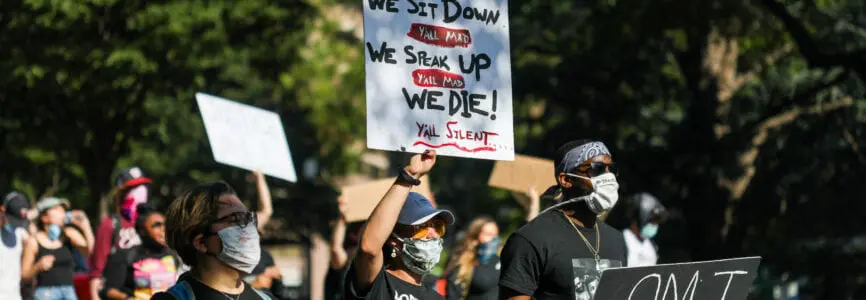Bioethics Forum Essay
Bioethics and Black Lives: A Call for Bioethics to Speak Against Racial Injustice
On May 25, George Floyd could not breathe while his neck was trapped under the knee of a police officer for nearly nine minutes. Yet despite the impressive scholarship of bioethics on ventilation and other technologies that prolong human breathing capabilities, it is largely silent on the suffocating effects of racism. Not speaking out has also been an unfortunate pattern within bioethics in other cases of violent loss of black life as a result of police brutality, such as Eric Garner who was refused CPR, and Freddie Gray who was refused prompt health care.
If these events of injustice have such strong ties to bioethics, then why the silence?
This silence might be linked to the white hegemony in early bioethical thinking and the pervasive lack of bioethics discourse in historically black spaces. Challenging this status quo requires an uncomfortable reckoning with the white power hierarchies that have currently and historically benefited the field of bioethics. As such, bioethicists might be loath to fundamentally challenge some of the power structures in our society that systematically oppress–and in the case of Floyd, kill–persons of color. While some bioethics leaders are cognizant of the historical exploitation of black bodies—including in clinical trials, access to and equity in regular health care provision, and the use of genetic material without informed consent–there needs to be an increased collective responsibility to analyze and respond to present ethical injustices.
We do not think that it is enough for bioethicists to respond to these racial injustices by merely abstaining from outward discrimination or passively resharing social media posts. As the field of bioethics gains prominence and credibility in analyzing ethical issues in American society, especially during this pandemic, we must recognize our non-neutral positions within ethics and the ways in which our scholarship shapes issues of medicine and biology. White and non-black persons of color within bioethics must spend the time and energy dismantling their privilege and advocating for a more inclusive and equitable bioethical discourse. The field needs to speak out against racist actions and policies–whether local or national–in the cause of what is just.
This burden cannot continue to fall on the most marginalized in our community as it has done in the past. As authors, we too, acknowledge that it is a privilege to have the time, emotional energy, and educational opportunities to write on these issues at a time when so many black Americans are facing direct affronts to their health, livelihoods, and safety.
What might a commitment to speaking against racial injustice in bioethics look like? Here are some ideas:
1) Incorporate specific antiracism training in bioethics education. This can be achieved through involving community partners and educating ourselves on the histories of race. When we understand that racism is a public health issue and a cause for chronic illness and psychological/physiological affronts, we can begin the work of making it the center of our advocacy and equity-creating work in bioethics. This of course, should be parallel to the critical self-reflective and privilege-dismantling processes that bioethics is beginning to undertake.
2) Adopt resistance and advocacy as core ethical values, not only in response to large tragedies but as a daily praxis in clinics, research settings, and policy. If justice is a foundational principle of bioethics, so must be the resistance against injustice. Advocacy in health settings is not new, and can take varying forms such as finding ways to actively participate in the Black Lives Matter movement, educating our own communities, supporting community and other local partnerships, and prioritizing caring for black communities impacted by these tragedies. A sample list of resources to be stronger allies can be found here.
3) Refuse to accept silence from prominent bioethics organizations on pressing racial justice issues. As antiracist author Ibram X. Kendi says: “there is no neutrality in the racism struggle. […] One either allows racial inequities to persevere, as a racist, or confronts racial inequalities, as an antiracist.” As a community that has been in the forefront of engaging in hard moral questions, we must start from our non-neutral racist histories and unpack the assumptions within our academic, educational, industrial, and policymaking communities in bioethics.
We know that these steps are only a start to the evolving and continued unpacking of our implicit and explicit, communal and individual, racial biases. We also acknowledge that there are unaddressed ethical tensions balancing the civic responsibility to resist structures of oppression in society (via protesting) with a concern for mitigating public health risks by minimizing large gatherings. However, this should not discourage bioethicists; bioethics is no stranger to controversy and unanswered questions. At a time when two simultaneous pandemics–Covid and racism–are defining what it means to live in North America, bioethics has the potential to play an instrumental role in advocating for change and supporting black communities in their quest for justice.
Zamina Mithani, MBE, is beginning medical school at the University of British Columbia and recently graduated from the Masters of Bioethics program at Harvard Medical School, Twitter: @zamina_mithani. Jane Cooper, MBE, is beginning law school at the University of Toronto and recently graduated from the Masters of Bioethics program at Harvard, Twitter: @JaneKCooper. J. Wesley Boyd, MD, PhD, is an associate professor of psychiatry and a faculty member in the Center for Bioethics at Harvard Medical School, Twitter: @JWesleyBoydMD.














Your excellent piece was followed by the usual disclaimer: “The opinions expressed here are those of the authors, not The Hastings Center”. If we are going to “Refuse to accept silence from prominent bioethics organizations”, I must ask what is the Hastings Center’s stance?
Great question. Please see this statement by Hastings Center president Mildred Solomon https://www.thehastingscenter.org/news/a-perilous-moment-for-our-nation/
-Susan Gilbert, director of communications and editor of Hastings Bioethics Forum